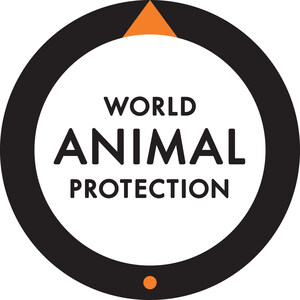NEW YORK, Oct. 24, 2019 /PRNewswire/ -- Today, World Animal Protection, a global animal-welfare organization with offices in 14 countries, released Behind the Smile, a new report that reveals dolphin entertainment is extreme animal cruelty masquerading as innocent fun. Unsuspecting tourists are fueling this multibillion-dollar industry while travel companies are reaping the rewards.
Millions of animal lovers every year are led to believe that dolphin shows, and experiences sold by some of the world's largest travel companies are cruelty-free, educational, and beneficial for conservation efforts. This could not be further from the truth. Rather, the industry is reaping billions of dollars in profits off the cruel captivity of dolphins kept for entertainment.
"Many people feel excited when watching dolphin shows or when swimming with dolphins because they love animals, and the dolphins appear happy, but in reality, their smile is just a physical characteristic and not an emotional response," said Executive Director Alesia Soltanpanah, World Animal Protection, US. "What these dolphins actually feel is cruelty and suffering from being held in captivity."
The report, Behind the Smile, is the most comprehensive assessment of captive dolphins to date. It reveals that globally:
- There are 336 dolphin entertainment venues in 54 countries – including the United States, Mexico, China, and many countries in the Caribbean – which hold at least 3,029 dolphins captive, the United States alone has 400 dolphins captive.
- These captive dolphins annually generate a staggering 1.1 to 5.5 billion USD for the venue owners. This does not include additional income from merchandise, food, sponsorships, and accommodations these captive dolphins generate.
- Specifically, in the United States, Miami Seaquarium houses the Pacific white-sided dolphins with an orca named Lolita. The tank in which Lolita resides is reportedly the smallest in the world for an orca and she has not seen another orca since her tank-mate Hugo died in 1980. The white-sided dolphins have been recorded routinely attacking Lolita- harassing, chasing and raking her with their teeth. Housing different species together in captivity - where there is no room for the animals to avoid each other – frequently leads to increased aggression and discomfort.
From these numbers, it's clear why this industry is built on deceiving the public: to protect the billions of dollars made at the expense of these animals. Inherent suffering is associated with all stages of dolphins' lives in captivity – although dolphins may appear to be smiling, they experience continuous stress and suffering when kept in captivity.
"Celebrities posting photos and videos with dolphins increases social acceptability of these experiences that lead to a lifetime of suffering for these animals. Dolphins are highly intelligent, social beings that suffer immensely when trapped in barren tanks to entertain humans," continued Soltanpanah.
In their natural environment, dolphins swim across a territory of more than 100 square kilometres (40 miles) of ocean freely. However, when held in tiny, barren, concrete tanks 200,000 times smaller than their natural space – in which they are exposed to infection, chemicals and often drugged to cope with captivity – the dolphins sadly can only swim a few feet at a time. The anxiety and stress can cause them to self-mutilate and become aggressive – all of which occurs in the name of entertainment and profit.
Many venues promote the rescue and rehabilitation of dolphins and claim to boost conservation efforts. In fact, as little as five to ten percent of zoos, dolphinariums, and aquariums are involved in substantial conservation efforts. The amount other venues spend on conservation is often less than one percent of revenue. Dolphins bred in captivity are not endangered species or eventually released to the wild; they are used solely to sustain the captive population, demonstrating the falsehood of conservation claims the industry makes.
"Leaders in the tourism industry such as Airbnb and the global educational travel organization EF Education First have already cut ties with dolphin venues to become leaders in this space. It is time for Expedia Group to stop profiting from dolphin captivity and help ensure that this is the last generation of dolphins in captivity," said Soltanpanah.
Encouraging visitors to see dolphins in cramped, featureless tanks gives little insight into the complex lives of wild dolphins in a natural environment. Dolphins being used as live surfboards and facing large crowds of people daily with loud music and cheering while enduring a never-ending stream of tourists seeking that perfect selfie is not humane entertainment.
Join the movement to call on Expedia Group to end the sale and promotion of venues that use dolphins for entertainment so that we can ensure this is the last generation of dolphins in captivity.
Key statistics from the report:
- 336 facilities in 54 countries worldwide keep dolphins, making dolphins by far the most commonly kept cetacean in captivity
- Of the 3,603 cetaceans identified at those facilities, 84% of them (3,029) were dolphins
- 59 orcas, 366 belugas, 13 pilot whales, and 136 other cetaceans were also kept in captivity
- More than eight out of 10 captive cetaceans are dolphins. Over 60% of all captive dolphins worldwide are kept by just five countries: China (23%), Japan (16%), the United States of America (13%), Mexico (8%) and Russia (5%)
- World Animal Protection research by Kantar shows:
- Globally, 17% (284,651,092 people) watched a show or performance involving dolphins in the last 3 years
- Globally, 5% (83,720,909 people) swam with dolphins in the last three years.
- Visiting a dolphin show is the third most common tourism activity involving wild animals
- Most dolphin species kept in entertainment venues are not endangered or threatened. Only six captive bred dolphins have ever been released into the wild
- No zoos, dolphin venues, or aquariums currently engage in captive breeding programs for endangered dolphin species.
SOURCE World Animal Protection

Related Links
http://www.worldanimalprotection.us.org
WANT YOUR COMPANY'S NEWS FEATURED ON PRNEWSWIRE.COM?
Newsrooms &
Influencers
Digital Media
Outlets
Journalists
Opted In





Share this article